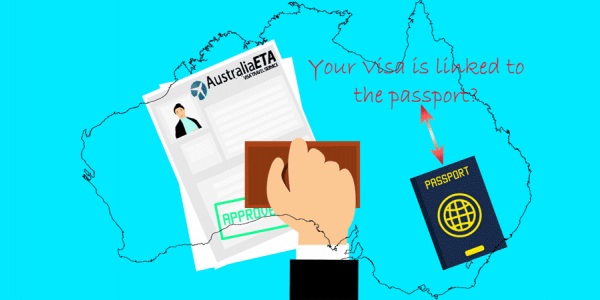Australian Customs and Passenger Card
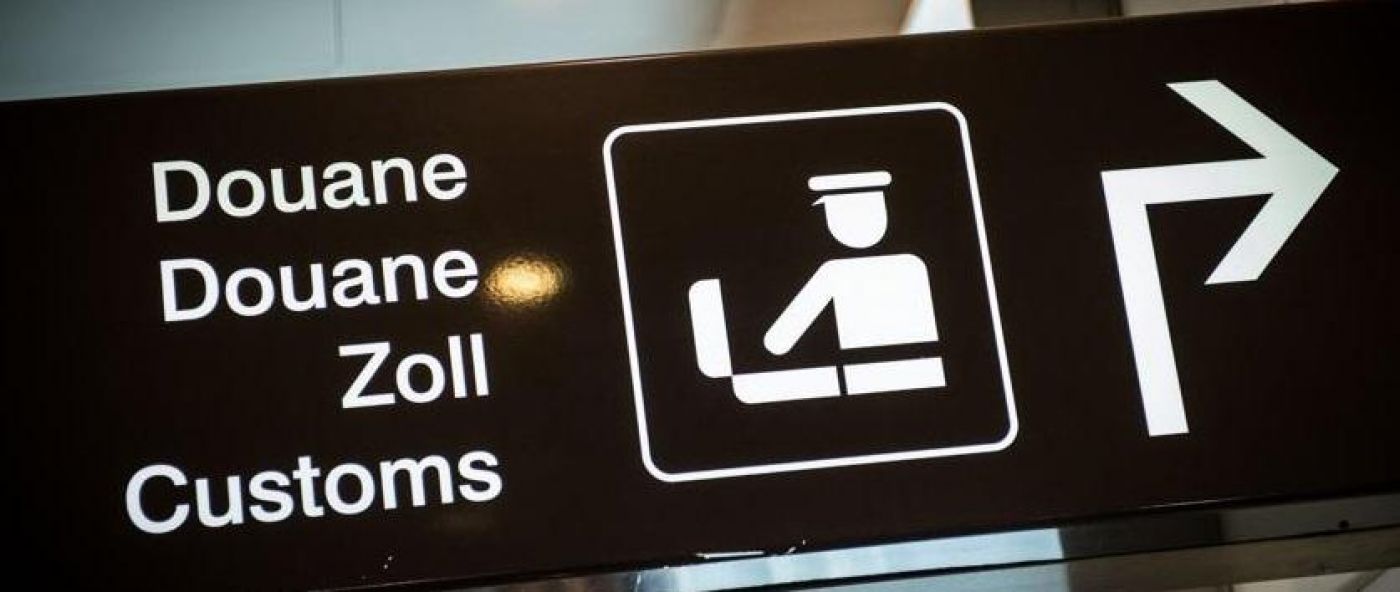
ETA visa or eVisitor visa for Australia (tourist or business) don’t guaranteed the entrance into Australian territory. There are other variables to consider, such as the customs and passenger cards closely linked to one another.
Australian laws impose very strict rules on what can be introduced into the continent. It is obvious that the Australian customs laws, as in all other countries, prohibit the importation of drugs, weapons and protected animals. There are other goods which can’t be introduced in Australia or for witch the law imposes quantity limits.
Checks on these assets start when the traveller has to take the plane or the ship to Australia, by filling in the:
Passenger card
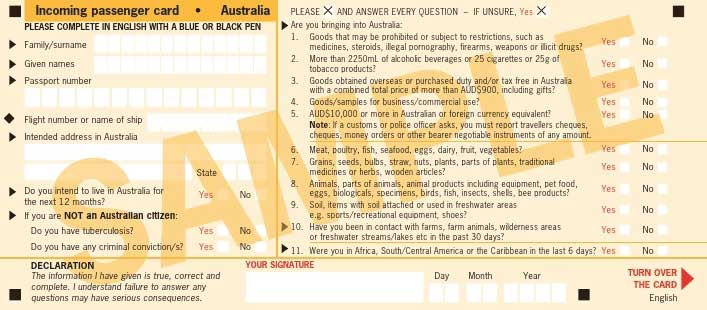
The passenger card is an English questionnaire issued by the crew. In this document, the passenger provides the details of the trip, the goods he is carrying, both as carry-on baggage and as checked baggage. This questionnaire is signed by the passenger during the trip to Australia or before departure and it must be completed in each field. The compilation of the "Passenger Card" is very important.
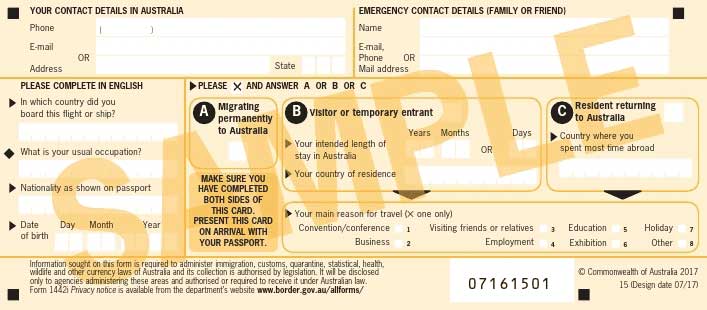
As the Australia visa, the "Passenger Card" is a complete legal and official document.
However, it may happen that some articles declared can be considered dangerous during a possible inspection by customs officials. In this case, the passenger can decide to destroy the items without costs or to leave them at the airport until his return, paying the cost of the deposit, or treating the article to make it safe; the latter option involves an additional cost for the passenger.Therefore, the passenger must always declare what he or she carries with him/her as hand baggage or in a suitcase.
If officials find objects not declared on the passenger's card, during an inspection, such omission will result in the payment of a fine of approximately $ 340 Australian dollars or a claim in the case of dangerous items or prohibited substances.
Landed with the plane in Australian territory, the passenger is led by agents of the Australian Border Force for a check. The agent on duty will show the travel documents (with which the valid Australian visa will be verified) and the completed passenger card will be delivered. The passenger can then retrieve the baggage or, depending on the answers provided on the passenger's card, can be stopped for a check of the baggage.
If this happens, the agent can ask questions related to the reason for the trip or related to some statements on the passenger card. Otherwise he can leave the airport without other checks.
Travellers and duty free
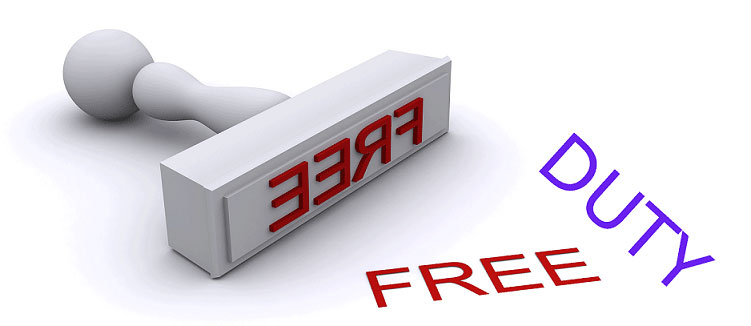
There are goods that can’t be introduced in Australia, while other Australian laws impose quantities deemed admissible.
Exemptions for passengers
International travellers with a regular Australian visa, including crew members, are entitled to a number of exemptions for goods imported in Australia.
The goods that passengers can take with them without having to pay taxes are as follows:
- Personal clothing and footwear (excluding fur clothing)
- Articles for personal hygiene and care (excluding perfume concentrates)
- Goods brought to Australia by visitors, that will be carry out outside Australia upon departure.
- Other items up to a total purchase price of $ 900 Australian per adult and $ 450 Australian per child (alcohol and tobacco products are excluded from this $ 900 Australian exemption). These are purchases made under duty free into ports or airports.
- A maximum quantity of alcoholic drinks equal to 2.25 litres for each adult passenger
- A maximum amount of tobacco in any form equal to 25 grams (cigarettes, leaves, etc.) Equivalent to about 25 cigarettes to which an open package can be added for each adult passenger.
If the exemption limits set by the Australian authorities are exceeded, will be applied taxes to all item of that type (generic products, alcohol or tobacco) and not only to goods that exceed the limit. If the passenger has anything exceeding the duty-free limit, he must declare it and he provide proof of purchase to an Australian Border Force employee for the calculation of any tax to be paid. The omitted declaration of activities bound to the limits could result in administrative sanctions. For families, their exemptions are double. For example: a family of three members (2 adults and 1 child) can carry a total of:
- 4.5 litres of alcoholic beverages
- 50 cigarettes plus two open packages
- Generic products worth 2,250 Australian dollars (including gifts, souvenirs, photos and camcorders, electronic equipment, leather goods, watches and sports equipment), or 2 licenses for generic products for adults ($ 900) + 1 licenses for generic products for minors ($ 450).
For the detailed list of goods to be declared on the passenger card or to the official, you can refer to the article published on our blog: "Australian Customs - List of activities to be declared".
How much money you can take with you
There is no limit to the currency you can bring with you to Australia, but if you exceed $ 10,000 you must declare it.
Medicines: which to take with you
There are rules to be followed to bring drugs to the country. Certain categories of medicines (such as those containing steroids) or some kind of medical equipment require a permit issued by the authorities (Therapeutic Goods Management Agency) before they can enter into Australia. Other categories that belong to the traveller’s exemption, can be introduced without having to obtain a permit.
Drugs such as paracetamol, aspirin and anti-fever infections don’t require a prescription, they are allowed and they shouldn't be declared.
On the other hand, medicines that require a doctor's prescription are allowed in Australia if you arrive by ship or plane, but they must be carried in your carry-on baggage in their original packaging and with a prescription stating the condition for which you take the drug, preferably translated into English.
The prescription drugs can be transported by the passenger to the extent that it allows a three-month cure, equal to the maximum stay that the tourist visa for Australia grants to the passenger.
Some of the drugs considered prohibited, such as antibiotics, painkillers or sedatives, can be imported, because they are in the passenger's exemption or "Passenger's exception". It is important to have the doctor's prescription with you.
For other travel restrictions in Australia you can consult the articles: Liquids in hand baggage - Medicines allowed when traveling to Australia - Australian Customs Goods to declare
Other articles that may interest you
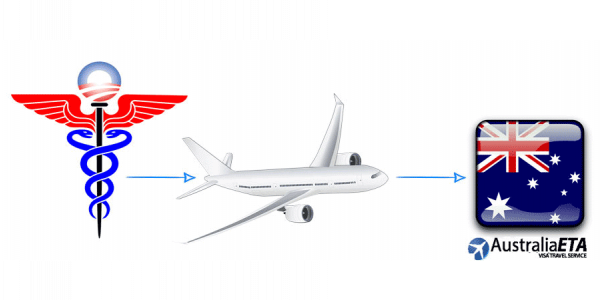
Medicines allowed when traveling to Australia
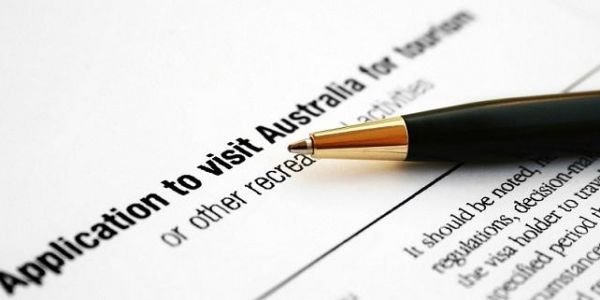
Other types of visas Australia
